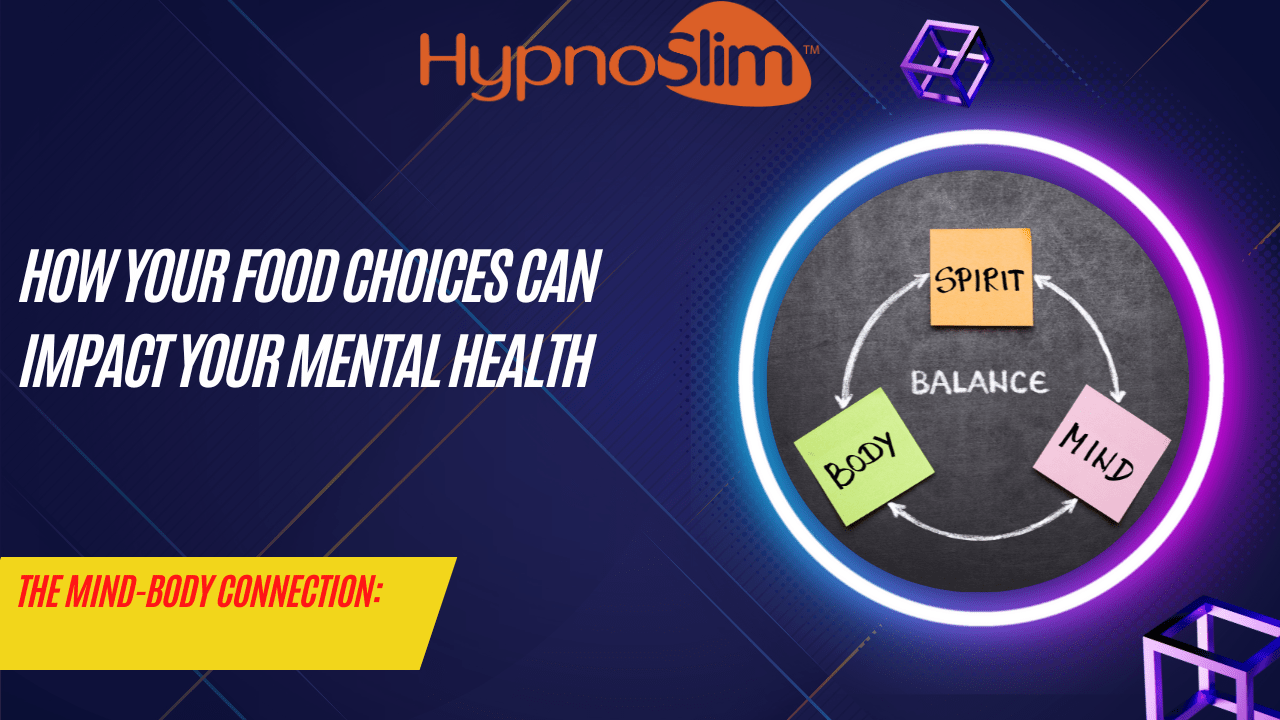No products in the basket.
Weight Loss
How Your Food Choices Can Impact Your Mental Health
The Mind-Body Connection:
How Your Food Choices Can Impact Your Mental Health
As a hypnotherapist, my goal is to help my clients achieve optimal mental well-being. Today, I want to shed light on a crucial aspect of your overall mental health that often goes overlooked, which is the food we eat. You might be surprised to learn that the food we consume has a significant impact on our mental well-being. By understanding this mind-body connection, you can make informed choices to support your mental health journey.
The Gut-Brain Axis
To comprehend the link between food and mental health, we must first explore the fascinating concept of the gut-brain axis. Our gastrointestinal tract is not only responsible for digestion but also houses millions of neurons that directly communicate with the brain. This intricate connection allows the gut and brain to constantly exchange signals, affecting our emotions, moods, and cognitive functions.
Nutrient Deficiencies
A well-balanced diet provides essential nutrients necessary for optimal brain function. Deficiencies in certain nutrients, such as omega-3 fatty acids, B vitamins, zinc, and magnesium, have been linked to mental health disorders such as depression, anxiety, and even attention deficit hyperactivity disorder (ADHD). Incorporating a variety of nutrient-rich foods into your diet can help maintain a healthy brain and improve your overall mental well-being.
Blood Sugar Levels
The food we eat plays a vital role in regulating our blood sugar levels. Consuming refined carbohydrates and sugary foods can lead to sudden spikes and subsequent crashes in blood sugar levels. These fluctuations can negatively impact our mood, energy levels, and concentration. By choosing complex carbohydrates, such as whole grains and fruits, and incorporating protein and healthy fats into our meals, we can stabilise our blood sugar levels, promoting a more balanced mental state.
Inflammation
Chronic inflammation is increasingly recognised as a key contributor to various mental health conditions, including depression and anxiety. Certain foods, such as those high in refined sugars, unhealthy fats, and processed ingredients, can trigger inflammation in the body. On the other hand, a diet rich in antioxidants, vitamins, and minerals, derived from fruits, vegetables, and whole grains, helps combat inflammation and supports a healthier mental state.
Gut Microbiota
The trillions of bacteria residing in our gut, collectively known as the gut microbiota, play a significant role in our mental health. These bacteria produce neurotransmitters and communicate directly with the brain via the gut-brain axis. Consuming a diet high in fibre, probiotics, and fermented foods can promote a diverse and thriving gut microbiota, positively influencing our mood and overall mental well-being.
Food Sensitivities
Individuals with underlying food sensitivities or intolerances may experience a range of mental health symptoms, including brain fog, mood swings, and irritability. Common culprits include gluten, dairy, and artificial additives. By identifying and eliminating trigger foods, often with the help of an elimination diet or food sensitivity testing, we can alleviate these symptoms and restore mental equilibrium.
It’s fair to say that the food we eat has a profound impact on our mental health. By prioritising a nourishing diet, rich in whole foods, and essential nutrients, and supporting our gut health, we can positively influence our mood, cognition, and overall mental well-being. As a hypnotherapist, I encourage you to embark on this journey of mindful eating, empowering yourself to achieve the mental balance you deserve. Remember, every bite you take is an opportunity to nourish not just your body but also your mind.

